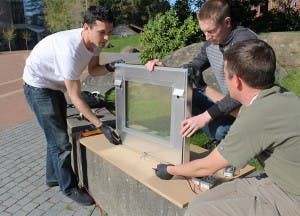
A team of seven students from Western and one from the University of Washington won a $75,000 grant last weekend for their prototype of a Smart Solar Window at the United States Environmental Protection Agency’s “P3: People, Prosperity and the Planet Student Design Competition for Sustainability,” which was held Saturday, April 11, and Sunday, April 12, in Washington, D.C.
The project that won the grant for the Western and UW team was a completely transparent window that uses nanoparticles embedded in the windowpane to redirect ultraviolet light into solar cells installed in the Window’s frame, according to Western graduate and University of Washington student Christian Erickson. This harnesses the energy of the sun and converts it into electricity used to power the Window itself, or the building around it.
The development and installation of these smart windows could reduce a building's footprint.
By lowering the amount of power it uses from outside sources to power heating, ventilation and air conditioning systems by letting airflow do some of the work, according to the team's project description on the competition's website.
“Let’s say you have a building, and one side is hot and the other side is cold. What a modern heating and cooling system might do to save energy instead of using AC is just open up windows on the cold side and keep the warm side closed,” he said. “Then you could pass cold air through the building. The Window just provides all of the energy to [itself] to do these sorts of things.”
The team's involvement in the P3 competition and the creation of the Smart Solar Window has been a long process, Erickson said.
"[About a year and a half ago] we put in the application,” Erickson said. “We heard back in summer 2014 that they were giving us $15,000 to build the Window and take it to the EPA. So all this year from September to a week ago we've been building that Window to take to D.C."
The process wasn't without its struggles, Erickson said.
"It represents a lot of work. Many, many hours went into building this Window,” he said. “It broke on the way, and we had to stay up the night before until 3 a.m. because one of the hinges broke. Thankfully, we were prepared and all that work paid off in the end.”
Even though some members of the team are seniors or graduate students and may move on before the project is completed, Erickson said the prize money the team won will be put to good use.
"What it will do is it will provide research funds to develop the Window. There will be some funds set aside, I think, for some undergraduates in the chemistry department to work over summer," he said. "This project is kind of tied to Western, but the entire team is going to continue giving input and will likely select the people who will move on with the project."
Western’s Finance and Marketing Department Chair Edwin Love, a mentor to the team, said the money will help fund improvements to the project and bring the students closer to getting the windows on the market.
“I think it puts us a lot closer to realizing the goal of getting these windows in commercial production, so that money is going to be used to improve the technology,” he said. “We already have a working prototype, but the next generation should be a lot more efficient and generate a lot more power.”
The competition brought together some of the top-engineering programs from all over the country, said David Patrick, a Western chemistry professor and adviser to the student team.
"[The team] should be properly proud for having won,” Patrick said. “They were — in their category — the best in this nation."
Love said he thought the experience was worth all the work the students did.
“I think [the award] validated all the hard work they put in it,” he said. “These are the things that students get the most out of. These are incredibly valuable learning experiences, and these guys are going to remember this for the rest of their lives.”
The P3 competition is hosted by the United States Environmental Protection Agency and projects are brought before a panel of experts created by the American Association for the Advancement of Science, according to the competition's website.





